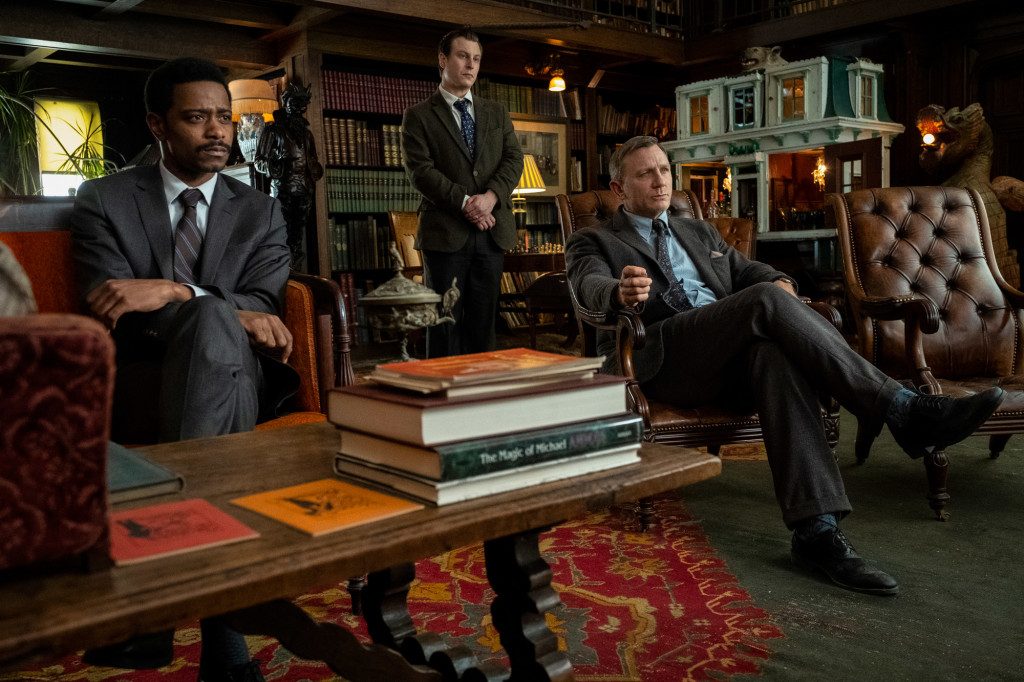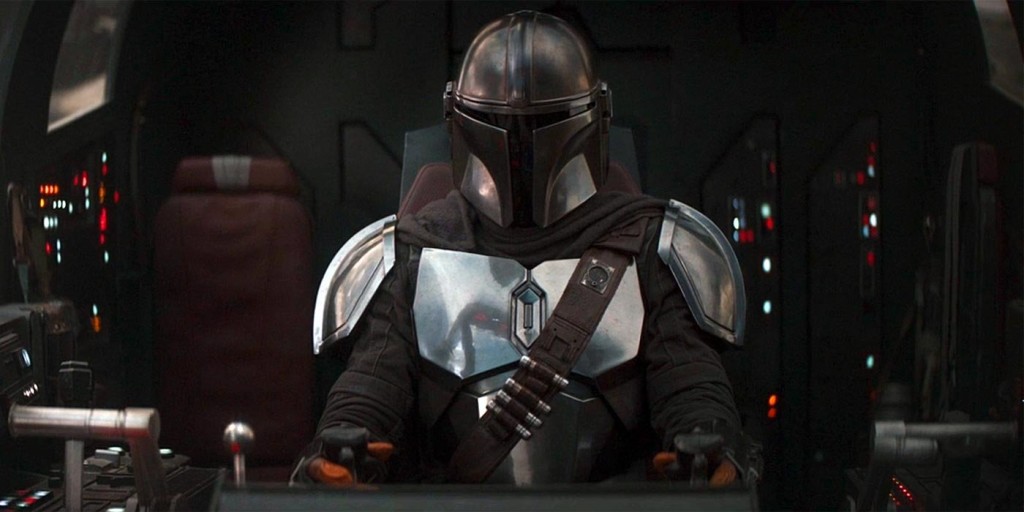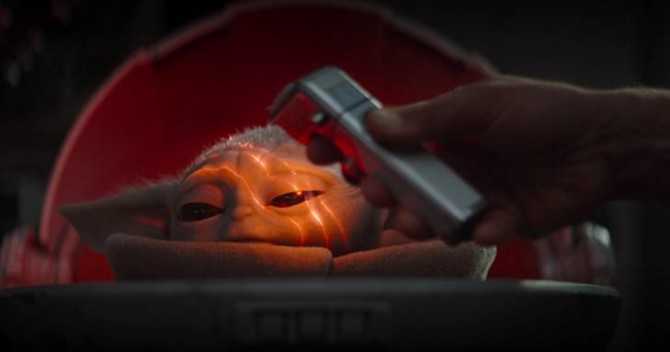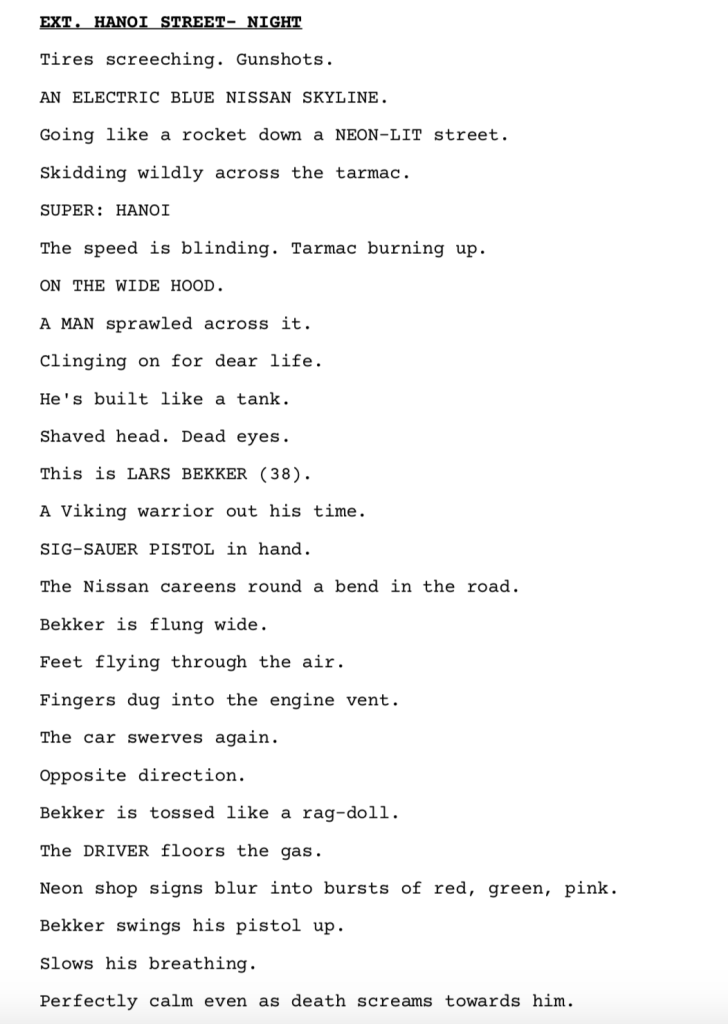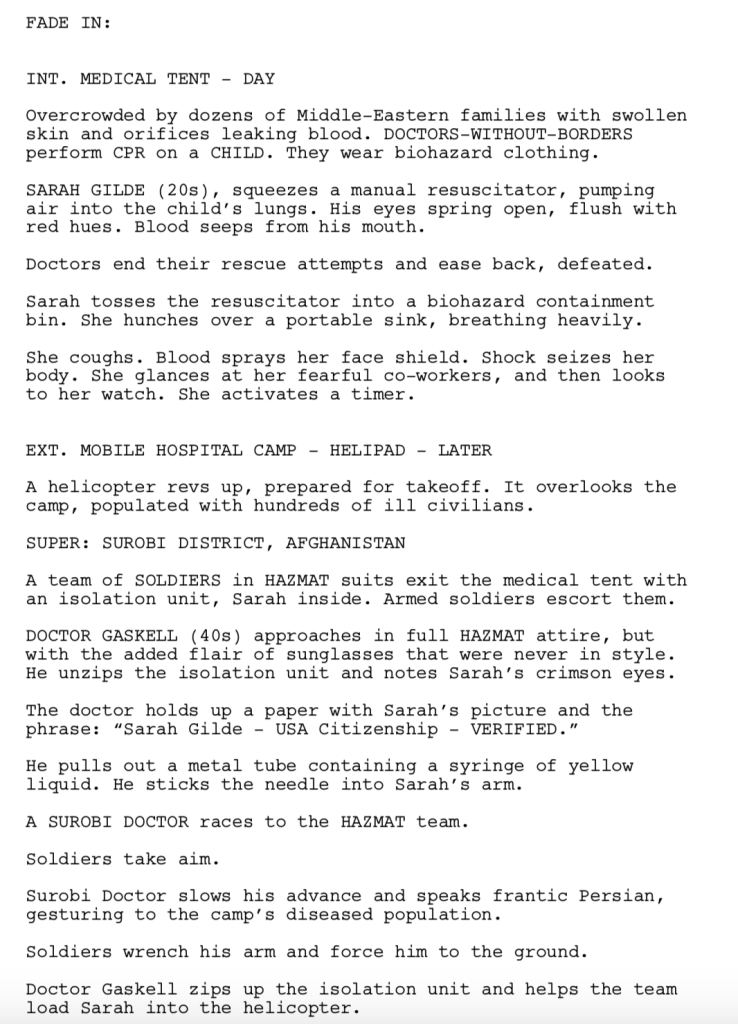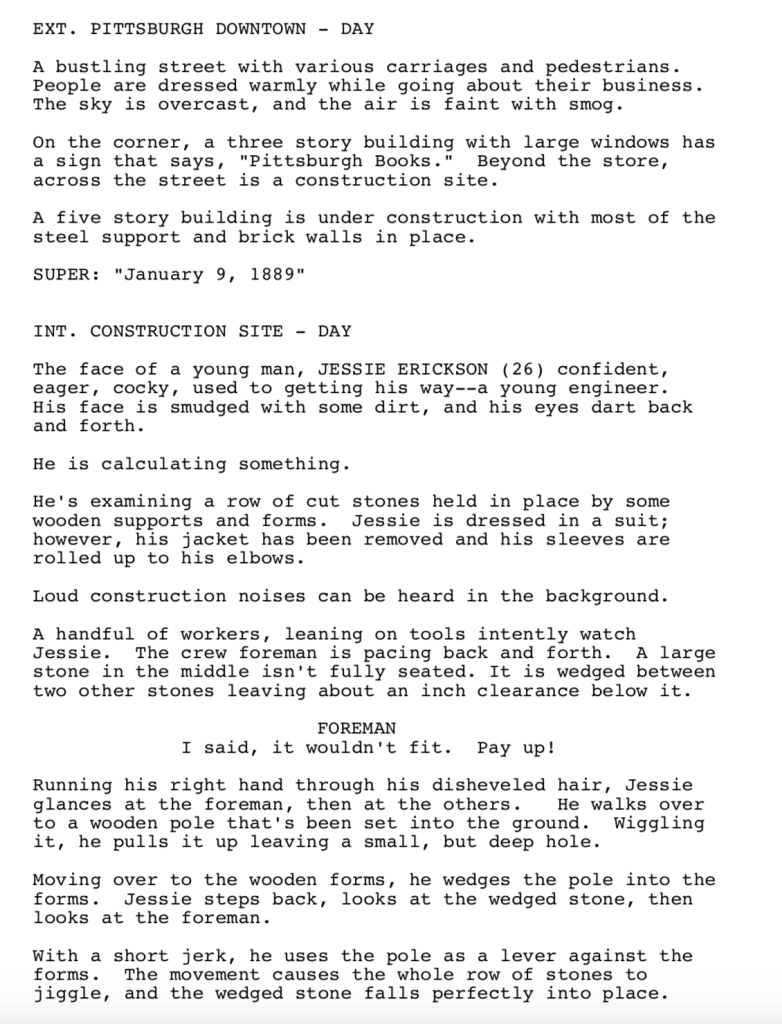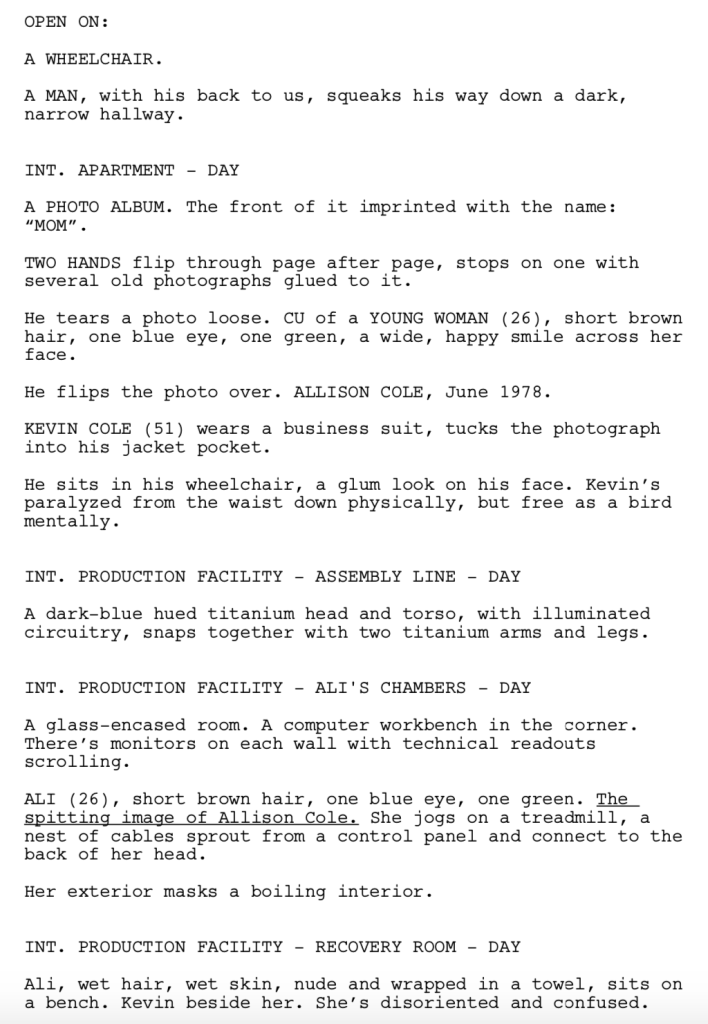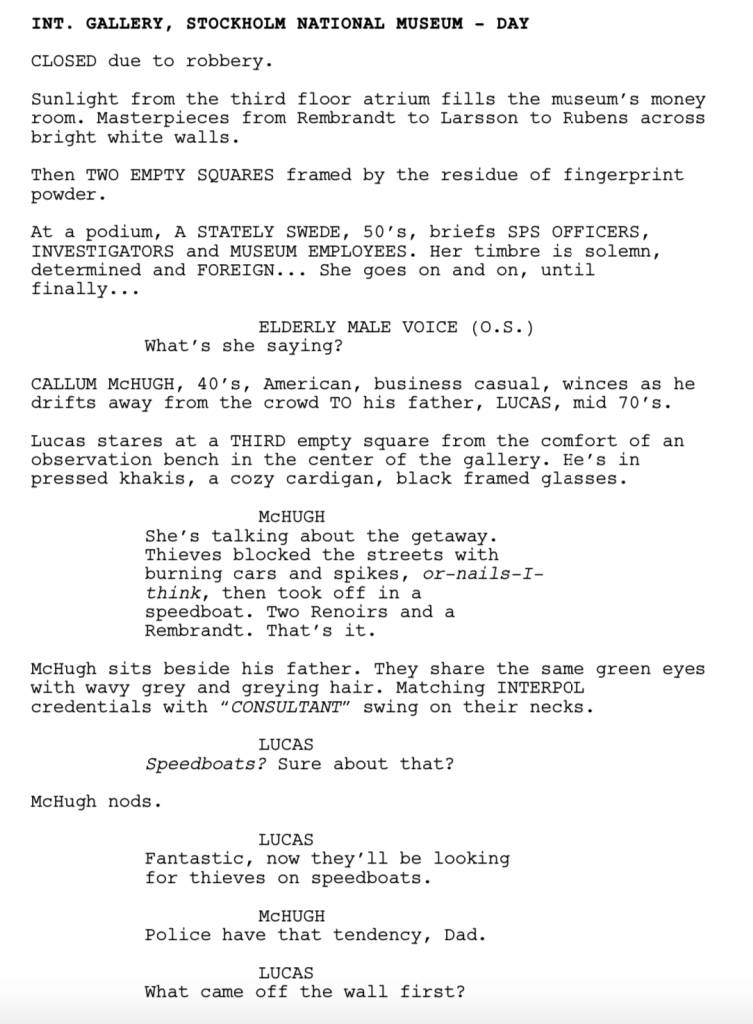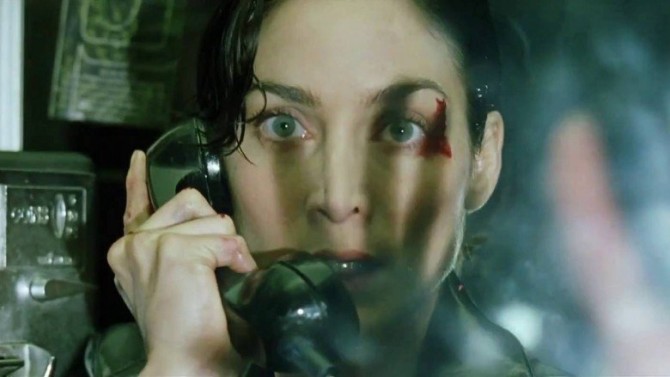Genre: Crime/Mystery
Premise: A family must answer questions about the suspicious death of their patriarch, who supposedly committed suicide on the night of his 85th birthday.
About: Knives Out played at festivals a couple months back, where it won over critics, receiving a 96% Rotten Tomatoes score. After experiencing a complicated response to his last film, Star Wars: The Last Jedi, Johnson decided to shuttle back from that far away galaxy and shoot a passion project, a story he’d been working on for ten years. He put together a great cast, shot the film, which finally hits theaters tomorrow.
Writer: Rian Johnson
Details: 129 pages
I’m a big Chicago Bulls fan dating back to the MJ days. More recently, we had a great player on our team named Derek Rose. And while everyone in the city loved Rose, he would occasionally say things that made you go, “Huh?” Like when the team was fighting to win a playoff series and Rose chose to sit out due to a questionable injury. When he was asked about it, he replied, “I’m sitting out so I won’t be sore during future meetings and my son’s graduation.” Huh?
This began a series of memes titled, “Derek Rose Says Stuff,” which highlighted any time Rose would say something that didn’t make any sense. I bring this up because this meme could just as easily be applied to Rian Johnson. “Rian Johnson Says Stuff.” Like when he came out weeks before The Last Jedi and proclaimed he had “zero interest in exploring Snoke.” Huh? The giant Emperor like character who’d been set up in the first movie?
Or “When I thought about it, Luke tossing the lightsaber over his shoulder was the only thing he would do.” Um, what?? The ONLY thing? As in, that was the only option in existence? “Rian Johnson Says Stuff” has now officially extended into the marketing campaign for Knives Out, as he was recently asked about whodunits: “I wanted to take the onus off of the viewer very early on to say don’t worry about solving this. As much as I love whodunits, I feel like that’s one of the weakest elements of them.” A whodunit where the director demands you not care who dunit? Okay.
Look, it’s no secret I’m not a fan of Johnson’s writing. I thought Looper was a disaster script and openly weeped when the folks at Disney gave him Episode 8. However, I do like the whodunit genre and I also like the idea of updating it. There are a lot of differences in investigating a crime in 2019 compared to 1919 and if the author can come up with a clever way to integrate a modern sensibility into the genre, who knows? Maybe this script is good. Let’s take a look.
There’s been a murder in Suh-vannah! (points to anyone who can name the reference)
Or a suicide. It’s a little confusing since 85 year old Howard Thrumbey’s neck was slit when the family found him. Usually when you see a slit neck, you think murder. But everyone here, including the police, assume Howard slit his own neck. Don’t ask me why.
The entire Thrumbey family was at the house for Howard’s birthday the night before. So the police come in to ask a few questions about the death as a formality. The major players are Linda, Thrombey’s oldest daughter, Walt, Thombey’s youngest son who ran his father’s publishing business, Jacob, Walt’s alt-right internet troll son, Joni, a Gwyneth Paltrow wannabe, Greantnana, Howard’s mother, and Ransom, the black sheep of the family.
Detective Elliot, who will be asking the questions, is joined by the mysterious (and famous) Benoit Blanc, a private investigator who will reveal later that he received an envelope full of money and a message to dig deep into this death because not everything about this family is what it seems. The investigation also includes one non-family member, Marta, Howard’s caretaker, who was quite close with him.
The entire first half of this movie is interviews. We interview every member of the family, ask what they remember about the previous night, and it all seems to add up. However, after the interviews are over, we flash back to learn that Marta was giving Howard his nightly medication when she realized she’d accidentally given him an overdose! Howard, realizing he had minutes left to live, tells Marta not to worry, and gives her a series of tasks to follow, which include being seen leaving, then sneaking back into the house later. This way, she won’t be a suspect. This means that we already know who killed Howard halfway into the movie.
Back in the present, the lawyer arrives and reads the will (major spoiler). Marta will be receiving EVERYTHING. Naturally, the family freaks out and demands a recount or whatever you do in these situations. The only person who seems to be enjoying himself is Ransom, who loves watching his family squirm. He offers Marta a ride home where he informs her he knows what she did. Which is fine. He doesn’t care if she gets his father’s inheritance, as long as he gets his share. So the two agree to work together.
But Blanc keeps digging as he feels a devout loyalty to the random envelope of money he received, and soon gets Ransom to admit what he knows about Marta. Marta is brought back in, tells Blanc she’s more than happy to confess. But Blanc tells her, no, there’s no need to confess. Because it’s someone else who did it! He then lays out to everyone what really happened that night, implicating the real criminal who did it, who is the last person we suspect! (not really).
“Knives Out” is similar to a lot of Rian Johnson’s movies in that there’s some good in here, there’s some bad in here, and the stuff in between either appeals to you or doesn’t, shaping your overall rating. I will say this. Johnson takes chances in his writing and he takes a major one here, when he informs us that Marta is the one who killed Howard halfway into the script.
This achieves a couple of things that make it different from your garden variety murder-mystery. For one, we shift the focus from ‘who did it?’ to ‘how is this going to play out?’ Also, since we now know what Marta did, the drama is now operating on the principle of dramatic irony. We know something all the other characters don’t which means we can participate in hoping that Marta’s mistake isn’t revealed.
Johnson then cleverly skyrockets the stakes by announcing Marta will be receiving the entire inheritance. Before she was just covering up her mistake. Now she’s covering up her mistake to receive hundreds of millions of dollars.
Another thing this choice achieves is that it takes our focus off of who did it, which allows for the final twist to be more impactful. If you spend an entire movie asking, “Who did it? Who did it? Who did it? Who did it?” the audience is going to be really demanding of the answer. But if they’re no longer asking who did it cause you’ve already told them, it’s a huge surprise when you reveal that someone else did it all along. So that was a really clever move by Johnson.
The script has two weaknesses, though. The setup takes way too long. A full hour. I was literally falling asleep trying to get through the first 60 pages. It was interview after interview of the family. And while almost everything we learn through these interviews is paid off later on in the script, you can’t help but wonder if Johnson could’ve cut the interviews in half or found a more entertaining way to convey all this information.
I’m guessing Johnson knew he’d get a killer cast and figured we’d be so delighted watching these actors go at it, we wouldn’t mind endless exposition scenes. And maybe that was the case. I can’t say since I’ve only read the script. But my experience has been when you start trying to convince yourself you can outrun basic storytelling tenets through your direction, you get into trouble.
The second issue is that the crime is convoluted. There’s a lot that goes into it. Character A tells Character B to go be seen, then sneak back in, and then we’re going to slit our throat to throw them off the scent of being over-drugged and Character C knew Character B would use a certain syringe so he switched the syringes and oh, but wait, there’s a toxicology report that could prove he was drugged so Character C burns down the toxicology building but then he didn’t need to because actually the drug Character B administered ended up NOT being the wrong drug, which means that Character A was never in danger of dying so had he not slit his own throat, he would’ve still been alive… and that’s just a fraction of it.
There’s a lot more to keep track of. And while I got most of it, I didn’t get all of it. I still don’t know why Howard had Marta leave then sneak back in. That part was confusing. I’m sure your enjoyment of this movie will depend heavily on whether all this stuff is clear or you’re like me and some of it is murky.
I’m sure the guy who proclaimed Luke throwing his lightsaber over his shoulder was the only thing Luke could’ve done in that moment will tell you it’s not about solving the mystery. It’s about the larger themes of the 1% versus the have-nots. And to a certain degree, that comes through. One of my favorite moments is when Meg, a snobby Vassar student working on a useless college degree talks to Marta after she’s inherited everything. She’s trying to get her to rethink accepting the money, pointing out that without her cut, Meg won’t be able to pay for tuition next year. Marta earnestly tells her, “You don’t have to worry about that. I’ll make sure you’re okay.” Meg’s realization that this woman who, ten minutes ago, was “the help,” is now in charge of her college tuition perfectly conveyed that theme.
But I can’t outrun the feeling that there’s a better ending in here somewhere. I thought maybe we’d get a Usual Suspects ending where Marta planned this from the jump. Or Howard was masterminding his family’s fall from the grave. Or maybe even Benoit did it. Instead (spoiler) the slimiest of all the characters ended up being the killer. It wasn’t that surprising.
I don’t know what to rate this. The first half is rough-going. Second half is good but not great. Had Johnson nailed the landing, maybe I give this a worth the read. But since the landing was on the clumsy side, I can’t recommend it.
[ ] What the hell did I just read?
[x] wasn’t for me
[ ] worth the read
[ ] impressive
[ ] genius
What I learned: I really like this trick I learned from Johnson of giving the audience the answer up front so that they stop asking the question. Since they’re not asking for the question anymore, you can totally surprise them later on with the answer.
Welcome to The Mandalorian Teleplay Chronicles. I will be reviewing every episode of The Mandalorian’s first season with an eye towards helping writers learn TV writing. Whether the show is a breakout hit or a Jar Jar Binks level bust, we’re going to be focusing on how to become better TV writers. Here’s a link to my review of the first episode here and also a link to the second episode.
Genre: TV Drama/Sci-fi
Premise: After the Mandalorian returns Baby Yoda for his bounty reward, he begins to have doubts about whether he’s done the right thing.
About: Chapter Three of The Mandalorian is written by Jon Favreau and directed by Deborah Chow, who is not only directing the seventh episode in the series but will be directing the ENTIRE Obi-Wan series, which initially seemed like a big task until Star Wars Net revealed yesterday that each episode will be only 7 minutes long. Oh stop it. I kid, I kid.
Writer: Jon Favreau
Details: 40 minutes (but without the lead-in or credits closer to 35 minutes)
Short episodes?
Good idea? Bad idea?
One of the most surprising things about The Mandalorian has been the episode length. And while, at first, everyone was angry with the choice, myself included, I’m starting to rethink my position. These last two episodes have been really good and I’m thinking that’s at least partly due to the fact that there’s no filler. Every scene moves the story forward.
I’m guessing that when they were putting these together and were asking the tough questions about how we make this feel like “Star Wars” but on a smaller budget, one of the ideas floated was, “What if we just made the episodes shorter?” Time is money in production. A minute of a Game of Thrones episode costs 200 grand. So if you can make your episode 40 minutes as opposed to 60 minutes you can save 4 million bucks! And you can move that saved money into other parts of the production.
So how did this episode compare to last week’s? I think I liked this episode even better. Baby Yoda may be the most inspired story choice ever – a screenplay cheat code. You can do some dumb a$$ stuff and we don’t notice because Baby Yoda just got out of his crib and started playing with a gear shifter.
But it’s not just that. There are some serious screenplay lessons to take from Baby Yoda. When you create a character, particularly a young character, who can’t fend for themselves, there’s a built in need for us to keep him safe. One of the reasons this episode never lags is because we’re so focused on if Baby Yoda is okay. We will not leave our seats or pause our televisions until we know that Baby Yoda is back in the Mandalorian’s care.
When you can create that kind of obsessive need between an audience and your characters, you’re got them in the palm of your hand. That’s what every writer who’s ever written wants. They want the audience in the palm of their hand. Why? BECAUSE IT’S SO HARD TO F*CKING DO. And Favreau figured out how to do it. And don’t discount this as some gimmick. In 8 movies dating back to the prequels Star Wars has tried to create a character this beloved and haven’t been able to do it. Baby Yoda is a revelation.
To give you a quick recap of the episode, the Mandalorian brings Baby Yoda back for his bounty and is paid handsomely. We can see some hesitation as he hands Baby Yoda over to the bad guy but after he uses the money to buy new armor, he’s feeling fly enough to forget about Baby Yoda. Or so we think.
He heads back to Greef Carga to get his next bounty where all the other bounty hunters are giving him the evil eye, as they were all after Baby Yoda too. After getting a new bounty chip, he heads back to his ship. However, right before he’s about to take off, something reminds him of Baby Yoda, so he turns the ship off and charges back into town.
He infiltrates Bad Guy’s hut, grabs Baby Yoda back, but as soon as he gets to the main street, those same bounty hunters who hate him are right there, making sure he’s not going anywhere. For the Mandalorian to get out of this, he’ll have to outwit upwards of 100 gun-happy aliens. With a baby in his hand! Can he do it? Or is he doomed and this is the end of the series?
Okay, since this Scriptshadow Series is about writing for television, let’s discuss what episode 3 of a season should be. Episode 1 was our “Introduce the world and main character and give us a great cliffhanger” episode, which is exactly what they did. Baby Yoda may be the greatest cliffhanger ever. Episode 2 is the “Proof of concept” episode where you give us an episode that shows us why your show is great. We get that with a fun “Jawas stole my ship” episode. With episode 3, you want to start opening up your world. The idea is that the audience comes into this episode thinking they understand the scope of your show but you show them that the scope is actually much deeper and more complex than they realized.
Why is this important? Because you want to create the thought of long-term commitment in the viewer’s head. Before they were just like, “This is fun! Baby Yoda!” You want them to start thinking beyond the next episode, into the full season, and, ultimately, into the whole series.
“The Mandalorian” accomplishes this by giving us more time in the mandalorians’ secret hideout underneath the town. We learn about something called the “Purge,” which killed a lot of Mandalorians after the fall of the Empire. They’re trying to build their people back up again. And the only way for them to do that is to stick together and honor the code. Going into this episode, I thought these Madalorians were bounty hunters who looked cool. But I left learning that there’s a lot more going on with their species and that they have a larger collective goal (to build their people back up).
Let’s move into plotting. When it comes to plotting your TV episodes, you should be using basic storytelling techniques. A character goal, stakes, urgency. That’ll do you good most of the time. However, you do need to mix things up sometimes so that the pacing of the show doesn’t get predictable.
For example, the “goal” of this episode doesn’t arrive until 40% of the way in, that goal being to get Baby Yoda and escape the planet with him. The first 2/5 of the episode, where the Mandalorian hands Baby Yoda over then heads off to his next job, doesn’t have a goal (well, he sort of has a goal, to get his next bounty, but it’s a false goal). So how does this section of the screenplay still work?
There’s a lesser known storytelling device which I’ve nicknamed “separation anxiety.” This is where you take two characters that the audience desperately want to see together and you cruelly split them apart with the threat that they might never see each other again. This is the device which I liked so much in the second half of the movie “Room,” with Brie Larson. She gets taken in for medical evaluation after they’ve escaped their captor, and that whole second half of the movie is driven by separation anxiety. We’re not going to be satisfied until her and her son are back together again.
The exact same thing is going on here. I want you to close your eyes and go back to the way you felt in the scene where the Mandalorian hands over Baby Yoda to the bad guy. I’m guessing it made you feel uncomfortable. I’m guessing you were thinking in your head, “No. NO. No. Don’t do it.” And once the Mandalorian left the exchange, I’m guessing all you were thinking about was, there’s no way he’s not going to go back and get him, and that the main reason you kept watching was for that. That’s an effective use of the separation anxiety technique.
It should be noted that this only works if you’ve done great character work with the two characters you’ve separated. That we not only like the characters individually but we like them together. Another key component to making separation anxiety work is selling that THEY’RE NOT GOING TO GET BACK TOGETHER. So you’ll notice that the Mandalorian makes it all the way back to his ship — even STARTS THE PRE-LAUNCH — before he changes his mind. We’re hopelessly thinking, “Is he really going to leave??”
It’s HERE where the story engine switches back to traditional GSU. His goal is now to get Baby Yoda and get off-planet. Stakes and urgency are also high.
But let’s get to the real juicy talking point of this episode. (spoilers) The deus ex Machina ending. All the mandalorians come and save Mando and Baby Yoda at the last second. This is the second deus ex Machina ending in the series so far. And there’s only been three episodes. Mando is about to be slaughtered by the Bullhorn creature when Baby Yoda force-saves him. And now the mandalorians show up and save him right as he’s about to be slaughtered by 100 bounty hunters.
Before you get upset, Star Wars has a long history with deus ex machinas. It’s got one of the originals, when Han Solo takes out Darth Vader just as he’s about to kill Luke so that Luke can blow up the Death Star. But not all deus ex machinas are created equal. And there are a few things you can do to make them work. When the deus ex machina is rooted in an emotional arc, it works. Luke didn’t just get saved by anyone. He got saved by someone who only cared about himself the whole movie, who arced into a character who finally cared about others. Our excitement that Han finally came around trumped the use of the deus ex machina.
Another thing you can do, which is what they did here, is create a half-and-half deus ex machina. This is where your hero does everything in his power to save himself first. So we see the Mandalorian jump in this droid cart and head down the street and keep shooting everyone and do everything in his power to survive. It’s only then that the deus ex machina arrives. We would’ve hated the deus ex machina had it occurred right at the beginning of his trouble when all the bad guys surrounded him. We need to see that our hero tries to solve his own problems first and we’ll be more forgiving is he’s saved after exhausting all those options. It’s never as good as your hero figuring things out on his own. But it’s certainly better than a straight deus ex machina where your hero doesn’t have to lift a finger.
I have to give Favreau credit. I didn’t think he was capable of this. But these last two episodes prove that this isn’t just trending to be a good show, it’s trending to be a great one. I can’t wait for the new episode next week. Nothing like a little Star Wars Black Friday combo. What’d you guys think?
[ ] What the hell did I just watch?
[ ] wasn’t for me
[ ] worth the stream
[x] impressive
[ ] genius
What I learned: Get some extra mileage out of your setup and payoff. Most people think of setups and payoffs as one-two punches. But you can actually get an extra moment out of them when the right opportunity presents himself. The setup and payoff everyone is talking about in this episode is when Baby Yoda starts playing with a ball joint from one of the levers on Mando’s ship as he’s landing at the beginning of the episode (setup). Then, when Mando has collected the bounty and is about to leave the planet, he goes to pull that same lever and sees that the ball is missing (payoff). It’s that hesitation that gets him to turn around and go back for Baby Yoda. It’s a wonderful moment. But wait! We get a SECONDARY PAYOFF when, at the end of the episode, when we’re back in the ship and Mando and Baby Yoda are leaving the planet, Mando unscrews the ball and hands it to an eager Baby Yoda to play with. It’s a heartfelt moment and a reminder that some payoffs have one more use in the tank.
Man, I didn’t know there was this whole hidden action writing community within Scriptshadow. Saw a lot of new faces in the submissions. First of all, thanks to everyone who sent in a submission. Picking loglines was difficult. If you didn’t make it, there’s no reason why a souped-up version can’t make another Amateur Showdown down the line.
A quick note on loglines. This is where a lot of submissions lost out. When you’re uncomfortable writing a logline, it shows. I can feel you searching for how to present your story. So make sure you’re getting feedback on these things. As much as you may hate it, it’s a necessary evil. What happens is that the people who stick around the longest in screenwriting figure loglines out because they have to. So by the very nature of learning how to write a good logline, you are displaying that you’ve dedicated yourself to the craft.
Do not forget we have HOLIDAY SHOWDOWN coming up on Friday, December 13th. If you have a holiday-themed script, send it in by the deadline, which is Thursday, December 12th, at 8:00 pm Pacific Time (I’ve given you two extra hours – use them!). It’d be great if we could celebrate an awesome script before the new year. So stop dwelling on not making Action Showdown and get to writing.
Amateur Showdown is a bi-weekly tournament where I pick five screenplays that were submitted to me and then you, the readers of this site, read as much of each script as possible and vote for your favorite in the comments section. The winner will receive a review the following Friday that could result in props from your peers, representation, a spot on one of the big end-of-the-year screenwriting lists, and in rare cases, a SALE!
In order to participate, e-mail me at carsonreeves3@gmail.com. Include your script title, the genre, a logline, and a pitch to myself and potential readers why you believe your script deserves a shot. It could be long, short, passionate, to-the-point. Whatever you think will convince someone your script is worth opening, make your case. Just like Hollywood, the Scriptshadow readers are a fickle bunch. So be convincing!
Good luck to all the writers this week!
Title: Berserker
Genre: Action
Logline: A ruthless bounty hunter, chasing a million-dollar reward, has one night to capture a vicious terror cell before they can exact their mission of vengeance and escape Jakarta.
Why You Should Read: Intelligence agencies have spent hundreds of millions of dollars on terrorist bounties since 9/11. Insider sources suggest vital information in the hunt for Osama Bin Laden was gained after a senior figure in the Pakistani military received a $25 million reward. Despite this, few movies have examined the crooked underworld of terrorist bounties or the men and women who make their living tracking down the earth’s deadliest militants for cash pay-outs. Berserker is a screenplay embedded in this covert mercenary war but it’s also a relentless no-holds-barred action script playing out across a single bloody night. It comes complete with ambushes, raids, knife fights, shootouts and car chases through the neon-lit streets of Central Jakarta! I think the set-pieces are innovative, the tension is constant and the pace is bullet-fast. At 92 cut-down pages it never stops moving.
Title: HEMORRHAGE
Genre: ACTION
Logline: A disaffected NYPD cop visiting her daughter in a state-of-the-art hospital is unwittingly caught in a hostage situation when extremists raid the building seeking the cure of a deadly virus.
Why You Should Read: I got my start writing for B-Movie King Roger Corman, which basically means your creative flexibility gets completely strapped by ultra-low budget constraints. I wrote “Hemorrhage” to break free of such restrictions and focus on telling a story about a hard-pressed mother struggling to mend old wounds between her sick daughter, albeit with armed extremists threatening to rip apart what little bond they have left. I love the thrill of a good action movie, especially ones with compelling antagonists whose motives aren’t simply black or white and make us truly fear for the principal characters’ lives. If you get a kick out of the same thing, then you’ll have a blast reading “Hemorrhage.”
Title: JOHNSTOWN
Genre: Action/Based on true events
Logline: An engineer, hired to inspect a dam owned by Andrew Carnegie’s secret fishing club, falls in love with an aristocrat’s daughter. During a storm, when the dam he’s trying to save fails, he must outrace the floodwaters to JOHNSTOWN to save her.
Why You Should Read: I don’t think the world spent two billion dollars for the Jack and Rose love story, meaning the draw for this story is the flood itself. This is the story of one of the worst disasters to ever befall the United States. There have been numerous documentaries, but not really a feature film. As we all know, it’s a feature film which gives a story both reach and emotional impact. I was born and raised in Johnstown. This story is part of my DNA. There are details in this script you won’t find in any book.
Title: Kamikaze
Genre: Action
Logline: After her creator is killed in a terrorist attack, an emotionally charged android, suffering from a fatal virus, struggles to hunt down the mercenaries responsible.
Why You Should Read: Kamikaze is a non-stop, can’t catch your breath action script. It’s placed very well in screenwriting competitions (finalist), it nabbed me a manager (we’ve since parted), but the script hasn’t gotten much traction. I’m really wanting to know if there’s something I’m missing, and if I genuinely have what it takes to make it. — The main character, Ali, in an android that can’t seem to keep her emotions in check, which is a major drawback to those that created her. The script plays with the concept of logic vs. emotion and how they can help/hinder in various situations. — Thank you for the opportunity to give it a read.
Title: The Third Wonder
Genre: Action
Logline: An art recovery specialist is sent to Iraq on the eve of Shock and Awe to determine if a missing drone’s last transmission proves the existence of the Hanging Gardens of Babylon.
Why You Should Read: I suppose the best way to answer this question is to first explain why I wrote it and what makes me believe that a year+ of my life is worth only the prospect of an hour+ of yours. Well… since a kid, I’ve always been fascinated with the Seven Wonders of the World, in particular, the Hanging Gardens of Babylon (meh, true and kinda nostalgic, but who really cares what I was into as a kid). With fact-based fiction as a guide, and since Babylon is only 60 miles from Baghdad, it seems logical that if the Gardens were ever to resurface it would’ve happened during the exhaustive search for WMD leading up to the Iraqi invasion (yep, tough to argue, but a 118 pages of this). The main character’s questionable moral compass and haunting family legacy make him better at his job, but will it cost him a chance at redemption? (intentionally vague—okay, but an art guy as the protag in an action flick?). A socially conscious look at the ownership of art and how it corresponds to a country’s cultural identity (it’s there, but seriously??). The sweeping geographical locations and the recreation of the only lost wonder of the world will be a feast for the eyes (yep, this will cost a fortune to make). With seven wonders come seven storylines (one down, six to go:).
Sometimes I’ll read an AO script because I like the logline, sometimes I’ll read one because of the genre, sometimes I’ll read one just to get an idea of what the competition is up to, but I always fall back on this one fundamentally basic reason—reading makes you a better writer.
You still have until tomorrow (Thursday) night at 8pm Pacific to enter your action spec for Amateur Action Showdown!
One of the most frustrating things about pursuing screenwriting for a majority of people is screenwriting contests. A lot of these feel like a crapshoot. Who knows who’s reading your script. That horror script you wrote that’s going to make IT’s box office look like Charlie’s Angels could end up in the hands of someone who detests horror movies. And who knows what order a reader reads your script in. Is it his second script of the day, where he’s alert and hopeful? Or his sixth script, where he’s exhausted and thinking about the three chalupa special at Taco Bell? And the whole thing just seems so SUBJECTIVE amirite? Does the best script win? The best idea? The most woke socially conscious biopic concept? Navigating this world can be equal parts frustrating and depressing. But I’m here to help you do better in these masochistic merry-go-rounds of mayhem. With a few tips and the right outlook, you’re going to start seeing results. Let’s get to it!
1) Most screenwriters enter contest scripts that aren’t ready – Look, I’m all for deadlines. Without deadlines, I’d never post anything on this site. But there’s a difference between a realistic deadline and a deadline where all you’ve done is put words a page. Nobody is going to give you points for getting a messy rushed script in on time. And I was guilty of this too. I would use the Nicholl deadline to finish a script and literally send the script on the final date at the last mailing pickup time of the day. And then I’d be mad when my script didn’t win. You are up against 100 to 7000 other scripts in a contest. Do you really think your rushed first draft of a script is going to do well? Nicholl gets rich off of people like you. While story will always be subjective, sloppiness is not. I want you to tattoo what I’m about to say to the inside of your eyeballs because it might be the best advice you’ve ever received: Contests are not about showing the world that you can write a screenplay too. They’re about writing something that STANDS OUT from the pack.
2) Tell a great story with your first scene – While contests are different from “real life” in that the reader will read the entire script, that doesn’t mean they’ll pay attention the entire script. If they’re not impressed with your first scene, their overworked reader brain will switch into skim-mode. Notice I’m giving you a very specific directive for the first scene. I’m not just saying, “Write a great first scene.” I’m saying: “Tell a story.” In other words, hook the reader with something, then make them have to keep reading the rest of the scene to find out how that hook concludes. A female hacker must escape a group of men who have come to capture her (The Matrix). A man calling a babysitter and telling her he’s going to kill her then hanging up (Scream). A man wakes up on a train with no idea why he’s there or who he is (Source Code). The reason to do this is because it’s one of the easiest ways to pull someone in quickly. And contests readers are exhausted so you want to pull them in quickly.
3) Professional presentation – Correct formatting, no misspellings, no grammar mistakes, no punctuation mistakes, no light text from cheap screenwriting programs, no ultra-wide dialogue margins, no “condensed” mode to turn your 130 page script into a 110 page script regardless of the fact that all the lines overlap each other vertically. This one seems obvious but as someone who’s read a lot of amateur screenplays, I can tell you that a lot of you who think you’re being professional aren’t. If you’re someone who has written under three screenplays, you are probably making some mistakes in your presentation. Become OCD about your presentation. It’s one of the most reliable ways for us readers to spot bad scripts.
4) Your dialogue is thin, obvious, and on the nose – While there’s plenty of debate about what constitutes the difference between good and great dialogue, everybody knows what bad dialogue is. Bad dialogue is characters saying exactly what they’re thinking in simplistic uncreative ways. It is characters espousing exposition like robots. It is characters who are speaking directly to the reader as opposed to the other character in the scene. It’s a long road to become good at dialogue but the starting point is your characters. If the characters are fun talky types, they’re going to have more interesting dialogue. If you know the character well, you’ll be able to write more specific dialogue for them (example: If you know your character once lived in France, they may occasionally throw a French word into a sentence). And if you know how to inject conflict into a scene, your dialogue will improve exponentially.
5) Know your audience – There’s an old documentary with Vince Vaughn where he takes a group of young comics out on the road to do stand up. One of Vince’s comedian’s central bits was about how real men don’t wear sandals. At their first show, he went on about how sandals are for wussies. The problem? They were at a Colorado college campus where 90% of the college men in the audience were wearing sandals. The boos from that crowd still echo in his ears to this day. What’s the lesson here? STOP SENDING GENRES TO CONTESTS THAT DON’T CELEBRATE THOSE GENRES. The Nicholl doesn’t celebrate horror scripts just as The Tracking Board doesn’t celebrate two American Indians trying to start a rug business in 1865. You live in the age of the internet. Do not send your script ANYWHERE until you go to their website and find out every script that has won and placed in their contest for the past five years. You’re going to save yourself a lot of wasted money. Trust me.
6) Contests tend to reward ingenuity – Most scripts read like every other script. The contained thrillers, the biopics, the Westerns, the guy with a gun, the buddy cop, the heist movie. There isn’t anything wrong with writing one of these scripts and executing it well. You can start a career with a great version of any of these genres. But in contests, these scripts blend into the background because they’re so common. The scripts that rise up tend to be those that try something different. For example, Shimmer Lake, which won Austin years back and later became a Netflix movie. That was a mystery that was told backwards. Stuff like 500 Days of Summer. Or yesterday’s and Tuesday’s scripts. There’s so much of the same in these contests that you stand out with a creative storytelling take.
7) You need at least 5 contests (with a single script) to know where you stand – A single contest not liking your script isn’t enough to identify where the script is or where you are as a writer. There are too many variables involved. However, if you send your script to five contests and it doesn’t advance in any of them (even to the second round), there’s likely something wrong with THE BASICS OF YOUR SCREENWRITING. We’re talking bad presentation, a huge page count, a vague concept, misspellings and grammatical errors, not understanding the basics of scene-writing (beginning, middle, end), lack of clarity in the writing, an inability to set up your hero effectively, no concept of what conflict is or how to use it. Good screenwriters have all the basics down. If you’re not advancing at all in contests, I can almost guarantee you it’s because you don’t know all of these things. So learn them and get back in there with your next script.
8) If you’ve written more than six scripts and still aren’t placing in any contests, GET FEEDBACK – I know I’m expensive so you don’t have to use me. But find SOMEBODY who understands screenwriting and can be honest with you. Otherwise you’re flying blind. You have no idea what to work on or what to improve. About five years ago, this writer came to me with this very problem. He’d been writing for 15 years and had never placed in a contest before. So he ordered a consultation and his script was this completely zany out-there concept. It was so weird. Out of curiosity, I asked him to send me the loglines for his previous five scripts. They were all really weird and out-there. It would be the equivalent of writing Armageddon and adding a cannibal storyline where one of the cannibals was a ghost. I said to him, dude, you’re all over the place. You need to simplify your concepts and stop trying to be so zany. And the next script I read from him was a major improvement. And he admitted to me that he would’ve never known his ideas were too weird had he not gotten feedback. He had been told early on that you have to write something that’s unique to get people’s attention and he mistakingly took that advice and applied it 1 million percent. The point is, you could be making the most obvious mistake with your script but if you don’t get feedback every once in a while, you’ll never know.
9) If you’ve consistently placed in contests (top 10 or 20%) but can’t get any further, you’re probably in one of two positions – a) You’re extremely talented but raw. Half your script has flashes of Tarantino but the other half feels like a compilation of Donald Trump’s tweets. b) You’re a screenplay technician who’s mastered the formula, but your script lacks big risks and stand out moments. There’s not enough creativity in your storytelling. If you’re the former, put aside six months and learn the nuts and bolts of screenwriting (especially structure). If you’re the latter, watch all of the weirdest (good) movies you can find and study the choices the screenwriters make that result in such a unique viewing experience.
10) Your script is only going to be as good as its concept and main character – Lame uninspired concepts do not turn into good scripts. Boring/weak/lame main characters don’t all of a sudden become interesting on page 90. You can be a good screenwriter but if you’re entering contests with one of these two problems, your script isn’t going to do well. Period.
I hope this was helpful. Leave your favorite contests in the Comments Section and I’ll put together a master list here.
SO FAR
Nicholl
Austin
Page
The Tracking Board
Genre: Sci-fi
Premise: In a place distant from our normal reality, a reclusive man charged with interviewing prospective candidates for the privilege of being born must choose between an applicant he likes and one he considers tough enough to survive in the real world.
About: Edson Oda is a 2017 Sundance Screenwriters Lab Fellow from São Paulo, Brazil. Like the great John Hughes, he started his career in advertising. Not only did he write Nine Days but is slated to direct it for Mandalay Pictures as well. The script finished with 7 votes on last year’s Hit List.
Writer: Edson Oda
Details: 113 pages
Ahhhhhhhhhhh!!!
We were so close!
So close to three impressives in a row. Nine Days had me all the way up to the last 20 pages. But it didn’t stick the landing. And I’m really torn up about it because just like yesterday’s masterful script, Nine Days is a high concept premise that doesn’t feel like anything else out there. I don’t know where all these cool ideas are coming from all of a sudden but I’m not complaining.
Will is a 40-something lifeless individual who lives way off in the middle of the desert. We realize quickly that Will’s existence situation is different. He spends all day, every day, watching a series of TVs in his living room. These TVs aren’t playing the latest episodes of The Mandalorian. They’re playing lives. Real lives, down on earth, in real time. We realize that Will is somehow connected to these people, although we don’t yet know how.
Will’s favorite life to watch is Amanda’s, a 28 year old master violinist. Amanda has maximized every opportunity in life. And tomorrow, she’ll be rewarded with the biggest concert of her career. Will preps for the big day like he’s about to watch the Super Bowl. He sees Amanda practicing in her room, sees her getting her things together, hopping in her car, driving downtown… and promptly slamming her car into the concrete wall of an overpass.
Will is devastated. What happened?? He doesn’t have time to mourn the loss, though. The next day, “candidates” start showing up at his house. These candidates are people who Will will interview over a nine day period and the “winner” gets to be born. There’s the goofball, Alexander. The romantic, Maria. The introvert, Mike. The a-hole, Kane. And then there’s Emma, a strange woman who doesn’t have any interest in following Will’s rules.
The competition revolves mostly around the candidates watching the same lives Will watches every day. Will will then ask them questions about what they watched. For example, someone will watch the life of Rick, a 9 year old boy who gets bullied every day and Will will ask, “What would you do if you were in Rick’s position?”
After each day of interviews, Will speaks to his neighbor, Kyo, who, unlike Will, is a never-lived. His only job is to make sure Will does his job confidently. Will also rewatches tapes of Amanda’s life, trying to figure out what led her to suicide. He’s convinced that if he watches every moment, he’ll identify what led her to her decision. The last remaining contestants are Kane and Emma. While Kane is mentally the strongest of the bunch, there’s something special about Emma Will can’t quite put his finger on. Who will win a chance at life? You’ll have to read the script to find out.
I love ideas that help you see common things in new ways. If one character says to another character, “You’ve done nothing with your life since you graduated high school,” that line disappears the second it reaches a reader’s head. But if you show us a woman working in a factory, robotically packaging one product after another every single day and a man watching her, writing down, “7789 days since selection. No significant/relevant new event,” – that’s the kind of perspective that makes you think about life. When was the last significant event in my life? What does my life look like from someone else’s perspective? That’s what this concept brought to the table.
Oda also sets up a nice structure for his story. We know there’s nine days til the decision. It’s right there in the title. We get a good feel for how the contestants are being interviewed – what information we’re trying to get out of them in order to make the decision. But Oda doesn’t stop there. Understanding that sitting in a house for 2 hours is going to get repetitive, Oda adds two strong subplots to break things up. The first is his nosy neighbor, Kyo, who Will is annoyed by but who keeps coming around anyway. And the second is the mystery of what happened to Amanda.
It’s important when you’re writing a screenplay that has a really clean structure like this one, to BREAK THINGS UP with subplots. You don’t want the story to get into too much of a rhythm because what happens is the audience starts being able to predict things. If the pattern is never disrupted then we’re eventually going to be ahead of the writer. Subplots can be used as pattern breakers. You can also use plot twists or character twists. But subplots are nice because you can bring them in and out of the story throughout the script.
I knew the writing was strong in Nine Days early on. There are rules to learn about this world. These people coming to Will aren’t exactly alive. It isn’t clear why they’re the ages they are. We don’t know who Will is or what his exact job is. So Oda writes this montage sequence on the first day of interviews where the contestants ask him these very questions. “And if I’m selected. Am I still gonna look like this?” “And what’s the difference between being here and being alive, besides the time duration?” The best exposition is the exposition the reader isn’t aware of. And because these characters genuinely wanted to know the answers to these questions, you don’t think for a second they’re exposition.
Oda was also good at setting up these little mysteries. For example, after a day at Will’s, we’d see Kyo walking to some unknown house we hadn’t seen before. He walked up to the door, which opened, but Oda wouldn’t show us who was inside. Only Kyo greeting them and walking in. That’s one more little mystery that I have to keep reading to discover the answer to.
But the script wasn’t perfect. The big problem was Emma. Emma is the most important character in the script. And yet she’s given the least amount of screen time of all the candidates. Which didn’t’ help since she was a poorly constructed character as is. Her defining trait was smiling like she knew something you didn’t. I’m not sure what I was supposed to do with that info.
What often happens when you don’t understand the character you’ve created is you build a mystery into them and convince yourself that it’s okay if they’re mysterious to you, the writer, as well. Sorry but that never works. The writer is God. The writer has to know everything. And the reason this ending is a mess is because Oda never figured this character out.
(MAJOR SPOILER) Will ends up picking Kane over Emma. Then learns Emma left him a bunch of notes of things she noticed in his house (????). So he ran after her in the desert and performed some sort of Shakespeare sonnet for her (it was unclear what he was reciting but it sounded like Shakespeare). It was supposed to show us Will finally being vulnerable, something he’d long ago stopped doing. But his lack of vulnerability wasn’t set up well. The Shakespeare sonnet wasn’t set up well. And since I still didn’t understand Emma, him performing this for her didn’t move me at all. So the ending was a huge bummer.
BUT this concept has tons of potential. And the script is 80% there. I think Oda can get it there if he completely reworks his third act. It’s not going to be easy cause I don’t think this works until you figure out who Emma is. And figuring out characters is always some of the hardest work you do as a screenwriter. But if he can conquer that, this movie could be great.
[ ] What the hell did I just read?
[ ] wasn’t for me
[x] worth the read
[ ] impressive
[ ] genius
What I learned: A trap many screenwriters fall into is overthinking their bigger characters and, in the process, creating someone messy and unfocused. That’s how I would define Emma. And yet, the same screenwriter is easily able to figure out their secondary characters, like Kane. Kane is a guy who has tons of confidence and who we know will be able to handle life on earth, but will his selfishness do him in? That’s the question we’re trying to answer in Kane’s journey. So my advice to screenwriters is to not overthink your bigger characters. Yes they will have layers and yes they will have nuance. But first, identify exactly who they are and what holds them back. I promise you that the simpler their core essence is, the easier they’ll be to write.

